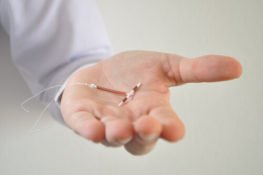Bayer's Mirena IUD Class Action Lawsuit Lawyers

Bayer’s Mirena IUD Class Action Lawsuit Lawyers
Mirena is the name of one type of intrauterine device (IUD) available for women who are seeking a long-lasting contraceptive. Mirena is manufactured by Bayer Pharmaceuticals. Like other IUDs, Mirena is implanted in the woman’s uterus. Once there, Mirena releases the hormone levonorgestrel over a period of up to five years. Mirena can help reduce the risk of pregnancy because levonorgestrel acts to inhibit the survival of sperm in the woman’s uterus. Mirena first appeared in Europe in 1991 and was approved by the Food and Drug Administration (FDA) in 2000. Since its introduction in the United States, numerous instances of women experiencing adverse side effects – some of them life-threatening – have been reported. While the FDA has not ordered the recall of the Mirena device, the agency has issued warnings about the potential side effects of Mirena use.
Warnings from the Food and Drug Administration
The Food and Drug Administration is the government agency responsible for evaluating drugs and medical devices prior to these drugs and devices being used by patients. The FDA may approve a drug or device for some uses or conditions and not for others; in addition, the FDA may also issue warnings about dangerous side effects the drug or device may be known to cause.
When it comes to Mirena, the FDA has warned that Mirena use may lead to:
- Ectopic Pregnancy: An ectopic pregnancy is one that occurs outside the woman’s uterus. The FDA’s warning indicates that up to 50% of pregnancies that occur while the Mirena device remains implanted in the woman are ectopic pregnancies. An ectopic pregnancy is a life-threatening situation that must be handled appropriately and promptly. In addition, a woman who experiences an ectopic pregnancy may have future fertility issues.
- Perforation: The FDA also warns that perforation of the uterine wall or cervix may occur during or after the insertion of the Mirena device. These tears may be partial or complete and may not be detected until after the device has already been inserted. Once a tear is suspected, however, the Mirena device must be removed. Reparative surgery may be necessary. If Mirena is not removed, the device may leave the uterus and travel to other parts of the woman’s body. For example, the device may travel to the intestines and cause additional perforations.
- Pelvic Inflammatory Disease: Pelvic inflammatory disease (PID) is an infection that can cause pain in the pelvis or lower abdomen, an odorous discharge, fever, and genital lesions or sores. Most cases of pelvic inflammatory disease will initially be treated with antibiotics. If such treatment is unsuccessful, the woman may require additional, more aggressive forms of treatment.
- Breast Cancer: As recently as 2015, the FDA has warned women who have had, who currently have, or believe they may have breast cancer to not use hormonal-based contraception like Mirena. The FDA has indicated some types of breast-cancer are sensitive to hormones, and use of Mirena by these women may exacerbate or complicate their breast cancer diagnoses.
Bayer Pharmaceuticals has been cited by the FDA in the past for failing to adequately inform consumers of the potential risks of Mirena. In a 2009 letter to Bayer Pharmaceuticals, the FDA informed the manufacturer that Mirena promotional materials did not adequately inform women that they may lose their child and/or their fertility if they were to become pregnant while using the Mirena device. That same letter found that Mirena’s promotional materials minimized the severity and frequency of the side effects that had been reported by individuals using Mirena.
Is Mirena Safe to Use?
Only you and your doctor can decide whether Mirena is a safe and appropriate form of contraception for you. Before deciding to use Mirena, it is important that you understand the risks and warnings about the device that have been issued by the FDA. Your doctor should review these risks and warnings with you during a consultation prior to the insertion of the Mirena device in your uterus.
While some women may be able to use the Mirena device without experiencing any side effects at all, other women may experience one or more of the serious side effects warned about by the FDA.
What To Do if I Am Injured by the Mirena Device
If you or a loved one have used the Mirena device and you believe this device has caused you or your loved one injury, contact Stern Law, PLLC right away for assistance. We have experience in helping women injured by this IUD recover compensation for their injuries and will help you do so as well. Stern Law, PLLC has the resources necessary to investigate your injury and determine whether you may be entitled to compensation. Call Stern Law, PLLC at (844) 808-7529 as soon as possible to protect your legal rights.













